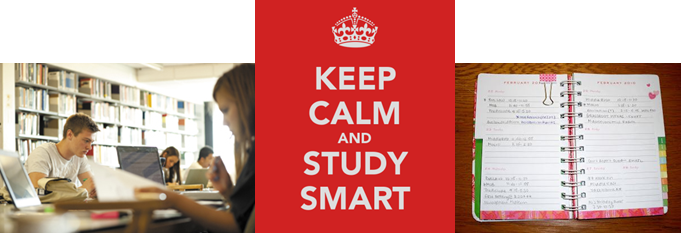Counselor's Corner
Skip to content
Study Smart

Do you have a hard time staying focused when you study?
Does homework seem to take longer than it should?
Do large assignments sometimes seem overwhelming?
Are your grades lower than they should be?
If you answered yes to any of the above questions, you may want to work on improving your study habits.
Students who “study smart” often spend less time studying, and yet they get better grades.
Students who “study smart” know how to make the most of their study sessions, and they get help when they need it.
“We are what we repeatedly do. Excellence then, is not an act, but a habit.” ~ Aristotle
Where and When to Study
Choose a good place to study – Your study area should be comfortable, quiet, well-lit, and have a surface for writing. Equip your study area with paper, pencils, pens, computer, calculator, etc.
Have everything you need – Before you begin, make sure that you have the correct assignments and all the materials you need.
Eliminate distractions – Turn off the TV and silence your phone. By eliminating all distractions, you force yourself to do one thing only – study.
Create a study plan – Some students study best at night. Others prefer studying earlier in the day. Try to study when you are the most alert.
While it’s best to have a regular time to study every day, many students have activities, jobs, or other responsibilities they must work around. Each day, figure out how much time you need for homework and studying, and then create a realistic study plan.
Get started – Don’t procrastinate or wait until you’re “in the mood”. Set a time to start studying and stick to it. If you have a hard time getting started, begin with something you can finish quickly or a subject you like.
Organize Your Study Time
Make a plan for your study session
Before you begin studying, decide exactly what you want to get done and the order in which you are going to do it.
Be specific. For example: do lab report for biology, read history pages 50-78, proofread English paper.
If you have a lot to do, prioritize your work. Start with the things that are the most important.
Break large assignments down
Use a planner to help you break large assignments into smaller, more manageable parts.
For example:
Mon – do research
Tues – make an outline
Wed – write first draft
Thurs – revise & write final draft
Alternate types of work
For example, read a story, do math, and then read history. If you have something to memorize, work on it first. Then go over it again at the end of our study session.
Take breaks
Research shows that students learn the most during the first and last then minutes of any study session.
After studying for 30 minutes, take a short break.
Get a snack
Get up and stretch
Resist the temptation to call a friend
Go online
Check your messages, snapchat, Instagram, twitter, Facebook
Save social media for later
Study Tips
Have a phone number for at least one person in each class. If you miss a class or have a question, you’’ then have someone to call.
Know where to find your teacher’s emails. If you have a question or need further clarification and can message them.
Complete written assignments early. This will give you time to edit and improve your work.
If you listen to music while you’re doing homework, try listening to classical music.
MS Word is the standard in word processing. Familiarity with Word’s shortcuts and features will save you countless hours.
Sometimes it’s helpful to study with other students. Study with students who are serious about their schoolwork, and keep study sessions focused and on track.
If there’s something you don’t understand during class, ask for clarification. If you’re struggling in a class, don’t wait. Get Help! Sign up for Encore.
The key to learning anything is REVIEW. When you review, you move information from your short-term memory into you long-term memory. Review often!
Learning styles
Knowing how you learn will help you make the most of your study time.
Visual learners are those who learn best by seeing. If you’re a visual learner, take notes, form pictures in your mind, use flash cards, and use color in your notes. Approximately 65% of all learners are visual learners.
Auditory learners are those who learn best by hearing information and ideas. If you are an auditory learner, have discussions, read and review information out loud, mad recordings, and explain what you’ve learned to someone else.
Kinesthetic learners are those who learn best by doing; hands on. If you’re a kinesthetic learner, move around while you study, rewrite or type your notes, use objects whenever possible, and act out ideas.
Regardless of your learning style, the more senses you involve and the more methods you use when you study, the more you will remember.
“Students learn 10% of what they read, 20% of what they hear, 30% of what they see, 50% of what they see and hear, 70% of what is discussed with others, 80% of what they experience personally, and 95% of what they teach to someone else.” ~ William Glasser
